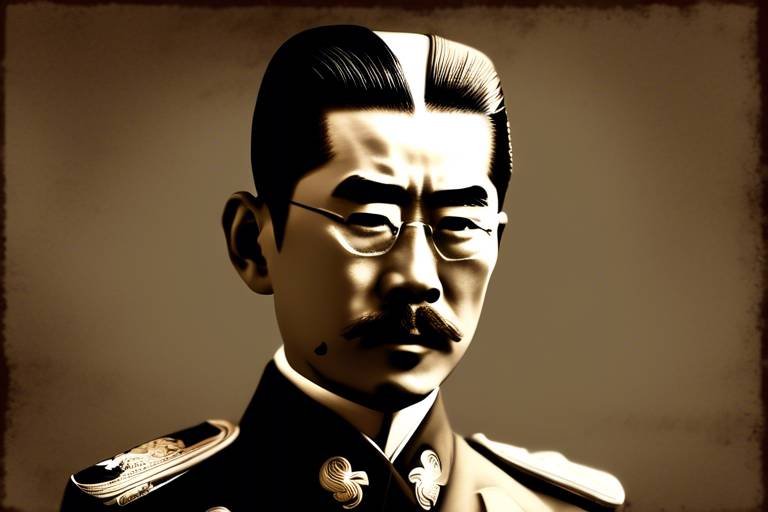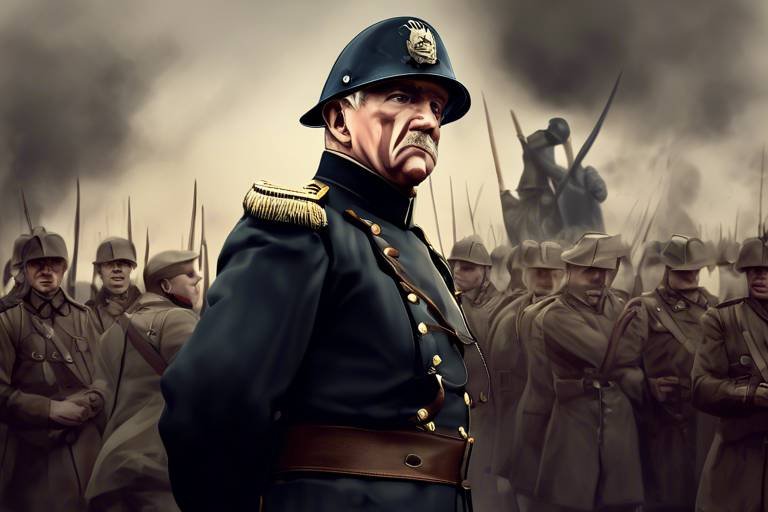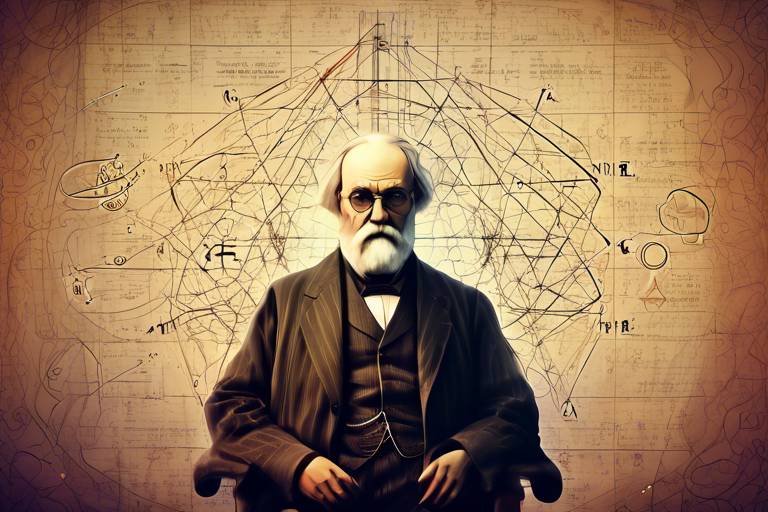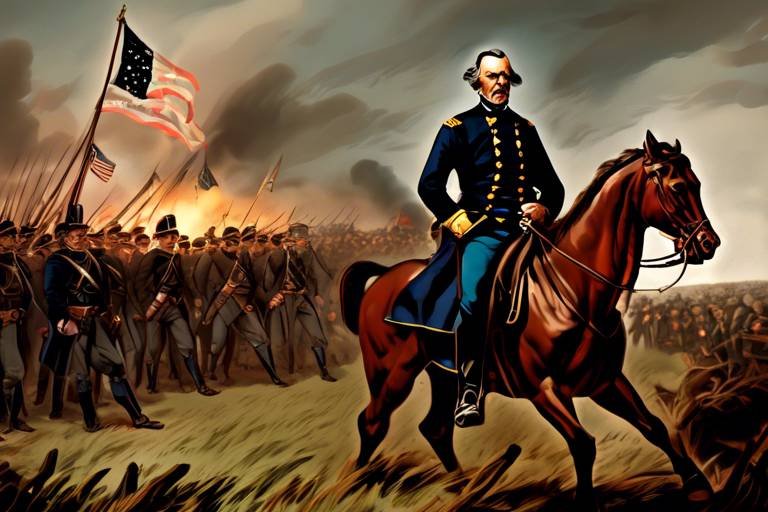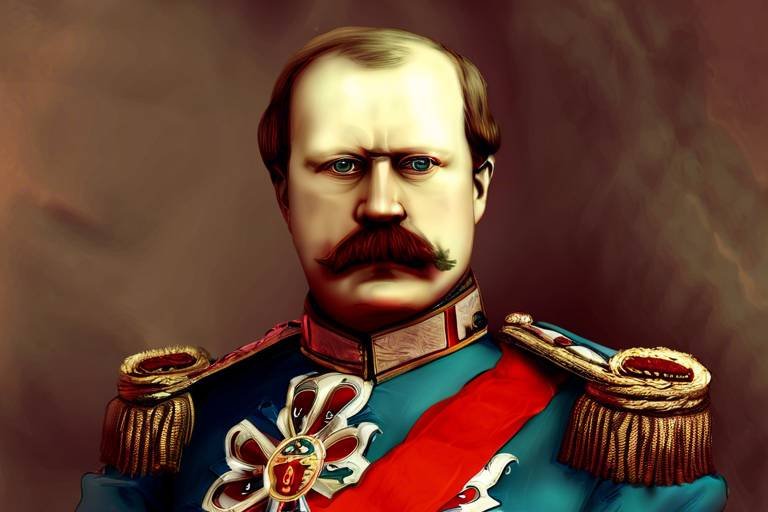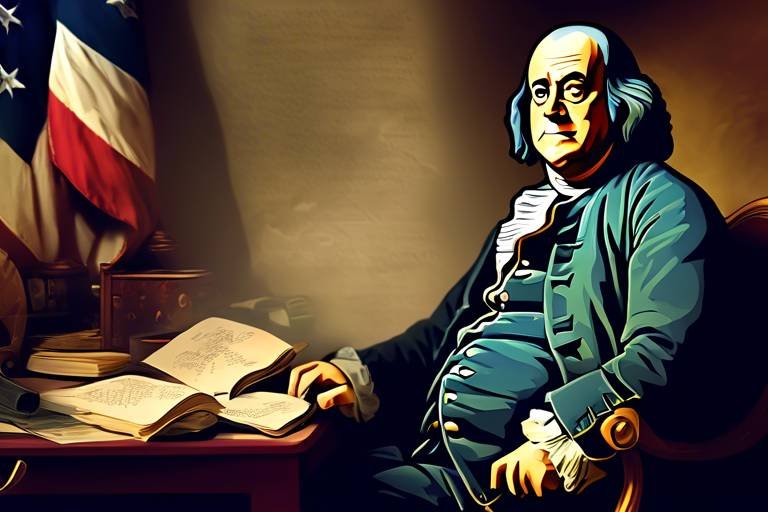Marcus Tullius Cicero: The Great Roman Orator
Exploring the life, achievements, and impact of Marcus Tullius Cicero, one of the most renowned Roman orators, statesmen, and philosophers in ancient Rome.
Imagine a time in ancient Rome where words held the power to sway crowds, shape politics, and inspire generations. In the heart of this vibrant era stood Marcus Tullius Cicero, a man whose oratory skills were as sharp as a gladiator's sword in the Colosseum. Born into a world of tumultuous politics and intellectual fervor, Cicero rose to become not just a speaker of words but a maestro of persuasion, a titan of rhetoric.
From his early days in the bustling streets of Rome, Cicero's voice echoed through the corridors of power, captivating audiences with his eloquence and wisdom. His journey from a young, aspiring orator to the pinnacle of Roman society was paved with determination, resilience, and an insatiable thirst for knowledge.
As Cicero navigated the treacherous waters of Roman politics, his words became his weapons, his speeches his battleground. With each carefully crafted argument, he defended the values of the Republic, championed the rule of law, and stood as a bulwark against the tides of tyranny.
But Cicero was not just a man of words; he was a philosopher, a thinker ahead of his time. Through his writings, he brought the teachings of Greek philosophy to the Roman world, sparking a revolution of thought that would resonate through the annals of history.
His clash with Julius Caesar, the colossus of Rome, was a clash of titans, a duel of ideologies that shook the foundations of the Republic. Despite facing exile and adversity, Cicero's spirit remained unbroken, his resolve unwavering in the face of adversity.
And when the winds of change swept through Rome, Cicero returned, like a phoenix rising from the ashes, to continue his crusade for justice, for liberty, for the enduring legacy of the Roman Republic.
Cicero's legacy endures, his words immortalized in the annals of time. His influence on Western thought, on the art of oratory, on the very fabric of society, remains as potent today as it was in the golden age of Rome.
So, as we look back on the life and times of Marcus Tullius Cicero, let us remember the man behind the words, the orator who dared to speak truth to power, the philosopher who dared to challenge the status quo. In the tapestry of history, his name shines bright, a beacon of hope, a testament to the enduring power of words.

Early Life and Education
Let's delve into the early years of Marcus Tullius Cicero, a man whose words would echo through the annals of history. Born in 106 BC in Arpinum, a small town southeast of Rome, Cicero was raised in a family of moderate means. Despite his humble beginnings, Cicero's father ensured he received a comprehensive education, emphasizing the importance of oratory and philosophy.
During his formative years, Cicero studied under some of the most esteemed teachers of his time, immersing himself in the art of rhetoric and the teachings of Greek philosophy. His insatiable thirst for knowledge and his natural talent for argumentation set him apart from his peers, foreshadowing his future success as a masterful orator.
At the age of 17, Cicero traveled to Rome to further his education, where he honed his oratory skills and immersed himself in the political and intellectual hub of the Roman Republic. His early exposure to the bustling metropolis of Rome and its diverse intellectual currents shaped his worldview and laid the foundation for his future endeavors in public life.

Political Career and Rhetorical Skills
When delving into the realm of Marcus Tullius Cicero's political career and rhetorical prowess, one cannot help but be captivated by the intricacies of his journey through the tumultuous waters of Roman politics. Cicero's eloquence in oratory was not merely a skill but a weapon that he wielded with precision and finesse, earning him a reputation as one of the most formidable speakers of his time.
Throughout his political career, Cicero navigated the treacherous terrain of Roman politics with a keen intellect and a sharp tongue. His speeches were not just words but powerful instruments that swayed the hearts and minds of the Roman populace. Whether defending the ideals of the Republic or lambasting his opponents with biting rhetoric, Cicero's oratory skills were unmatched.
One of the pivotal moments in Cicero's political career was his involvement in the Catiline conspiracy, where he delivered a series of speeches known as the Catilinarian Orations. These speeches not only exposed the treachery of Catiline but also showcased Cicero's ability to rally support and maintain the stability of the Roman state in the face of grave threats.
Moreover, Cicero's rhetorical skills were not limited to the political arena. His philosophical works, such as "De Oratore" and "Brutus," delved into the art of rhetoric and oratory, solidifying his reputation as a master of persuasion and argumentation. Cicero's influence extended beyond his time, shaping the course of Western rhetoric and philosophy for centuries to come.
In essence, Cicero's political career and rhetorical skills were not just a means to an end but a testament to his enduring legacy as a statesman and orator par excellence. His ability to harness the power of words and wield them with precision and grace remains a shining example of the art of persuasion and eloquence.

Philosophical Contributions
When it comes to Marcus Tullius Cicero's , it is impossible to overlook his immense impact on Roman intellectual thought. Cicero's philosophical pursuits were not only profound but also instrumental in bridging the gap between Greek philosophy and Roman society. Through his extensive writings and teachings, Cicero played a pivotal role in popularizing Greek philosophical ideas among the Roman elite and the general populace.
One of Cicero's notable philosophical works is his De Officiis, a treatise on ethics and moral duty that continues to be studied and admired for its timeless wisdom. In this work, Cicero explores the principles of justice, honesty, and integrity, emphasizing the importance of virtue in both personal conduct and public life. His philosophical insights have served as a guiding light for generations of thinkers, inspiring ethical reflection and moral contemplation.
Cicero's philosophical legacy also extends to his dialogues, such as De Oratore and De Republica, where he delves into the nature of rhetoric, the ideal statesman, and the principles of governance. Through these dialogues, Cicero not only showcases his rhetorical prowess but also offers profound insights into the complexities of political life and the pursuit of the common good.
Moreover, Cicero's synthesis of various philosophical schools, including Stoicism, Epicureanism, and Academic skepticism, demonstrates his intellectual versatility and his commitment to exploring diverse philosophical traditions. By engaging with these different schools of thought, Cicero enriched the Roman intellectual landscape and fostered a culture of philosophical inquiry that would endure for centuries to come.

Role in Roman Republic
During his time in the Roman Republic, Marcus Tullius Cicero played a significant role in upholding the traditional values and principles of the Roman state. Known for his staunch defense of the republic and its institutions, Cicero emerged as a vocal advocate for the rule of law and the preservation of the Roman constitution. His unwavering commitment to the ideals of the republic earned him a reputation as a defender of Roman liberty and a champion of the Senate's authority.
Cicero's involvement in the Roman Republic extended beyond his rhetorical prowess in the Senate and the courts. He actively participated in political debates, seeking to maintain the balance of power between the various factions vying for control in Rome. As a statesman, Cicero navigated the complex political landscape of the republic, often mediating disputes and advocating for compromise to prevent the escalation of conflicts that could threaten the stability of the state.
One of Cicero's most notable contributions to the Roman Republic was his unwavering defense of the traditional republican values against the growing influence of populist leaders and authoritarian tendencies. He consistently spoke out against attempts to concentrate power in the hands of a single individual, emphasizing the importance of collective decision-making and the rule of law in governing the republic.
Throughout his career in the Roman Republic, Cicero remained dedicated to promoting the principles of justice, integrity, and accountability in public life. His commitment to upholding the ideals of the republic, even in the face of political pressure and personal risks, exemplified his steadfast belief in the strength of Rome's republican institutions and the importance of civic virtue in governance.
In conclusion, Cicero's role in the Roman Republic was marked by his unwavering dedication to preserving the traditional values and institutions that defined Roman society. His contributions as a statesman, orator, and defender of the republic's principles left a lasting impact on the political landscape of ancient Rome and continue to inspire admiration for his commitment to upholding the ideals of a free and just society.

Conflict with Julius Caesar
During the tumultuous times of ancient Rome, Marcus Tullius Cicero found himself embroiled in a fierce conflict with none other than Julius Caesar, the ambitious general and statesman. The clash between these two towering figures of Roman history was not merely a clash of personalities but a collision of political ideologies and power struggles that reverberated throughout the Republic.
Julius Caesar, known for his military conquests and political maneuvering, represented a shift towards autocratic rule and centralized power. On the other hand, Cicero staunchly defended the traditional republican values of Rome, advocating for the supremacy of the Senate and the preservation of the Roman constitution. Their opposing viewpoints set the stage for a dramatic confrontation that would shape the course of Roman history.
As Caesar's influence grew and his ambitions expanded, Cicero became increasingly wary of the general's intentions. Despite their previous alliance and shared political goals, Cicero could not ignore the signs of Caesar's growing power and disregard for the established norms of the Republic. This growing tension eventually erupted into open conflict, with Cicero becoming one of Caesar's most vocal critics.
Caesar, in turn, viewed Cicero as a hindrance to his plans for consolidating power and reforming the Roman state. The clash between these two titans of Roman politics reached its peak during Caesar's dictatorship, as Cicero continued to resist his autocratic rule through speeches and writings that condemned Caesar's actions and policies.
The conflict between Cicero and Julius Caesar ultimately culminated in Caesar's assassination in 44 BC, a pivotal moment in Roman history that marked the end of the Roman Republic and the beginning of the Roman Empire. Cicero's role in this tumultuous period highlighted his unwavering commitment to republican ideals and his willingness to stand up against tyranny, even at great personal risk.

Exile and Return
After being declared an enemy of the state in 58 BC, Marcus Tullius Cicero was forced into exile by his political adversaries. His exile, which lasted over a year, was a tumultuous period marked by uncertainty and isolation. Cicero, known for his resilience and unwavering commitment to his principles, faced numerous challenges during this time.
Separated from the political landscape of Rome, Cicero spent his exile reflecting on his past actions and contemplating his future. Despite the hardships he endured, Cicero continued to engage in philosophical pursuits, honing his intellect and deepening his understanding of ethics and governance.
During his exile, Cicero maintained correspondence with his allies and supporters, seeking solace in their words of encouragement and solidarity. His letters from this period provide insight into his state of mind and his unwavering dedication to the ideals he held dear.
Upon his eventual return to Rome in 57 BC, Cicero was greeted with a mix of relief and apprehension. His homecoming symbolized a triumph over adversity and a reaffirmation of his commitment to the values of the Roman Republic. Despite the challenges he faced during his exile, Cicero emerged stronger and more determined than ever.

Legacy and Influence
When it comes to the legacy and influence of Marcus Tullius Cicero, it is undeniable that his impact on Western thought and rhetoric is profound and enduring. Cicero's eloquence and mastery of oratory have left an indelible mark on the world of public speaking and persuasion, inspiring generations of politicians, lawyers, and scholars.
One of the key aspects of Cicero's legacy is his role in shaping the concept of natural law and the idea of universal moral principles that transcend the laws of individual societies. His philosophical works, such as "On the Republic" and "On Duties," have had a lasting influence on ethical theory and political philosophy, laying the groundwork for modern concepts of justice and morality.
Furthermore, Cicero's defense of republican values and his staunch opposition to tyranny have made him a symbol of resistance against oppressive regimes throughout history. His writings on the importance of constitutional government and the rule of law continue to resonate in contemporary debates on governance and democracy.
In the field of rhetoric, Cicero's rhetorical strategies and persuasive techniques remain a subject of study and admiration for scholars of communication and persuasion. His emphasis on clarity, logic, and emotional appeal in public speaking has set a standard for effective communication that is still relevant in today's world of media and politics.
Moreover, Cicero's commitment to intellectual inquiry and his dedication to the pursuit of truth have inspired countless thinkers and writers to engage in philosophical dialogue and critical thinking. His influence can be seen in the works of Renaissance humanists, Enlightenment philosophers, and modern intellectuals who continue to grapple with the enduring questions of ethics, politics, and society.
In conclusion, Marcus Tullius Cicero's legacy as a great Roman orator, statesman, and philosopher transcends the boundaries of time and continues to shape our understanding of rhetoric, philosophy, and political theory. His enduring influence serves as a testament to the power of words, ideas, and principles in shaping the course of history and the evolution of human thought.

Modern Relevance and Study
Exploring the life, achievements, and impact of Marcus Tullius Cicero, one of the most renowned Roman orators, statesmen, and philosophers in ancient Rome.
When we delve into the modern relevance of Marcus Tullius Cicero, we uncover a treasure trove of wisdom and insight that transcends time. Despite living over two thousand years ago, Cicero's works continue to resonate with contemporary society, offering valuable lessons in rhetoric, philosophy, and governance.
His profound understanding of human nature and persuasive communication techniques have made Cicero a timeless figure in the study of rhetoric. Even in today's digital age, where communication is often reduced to 280-character tweets, Cicero's emphasis on eloquence, clarity, and emotional appeal remains a cornerstone of effective public speaking and writing.
Moreover, Cicero's philosophical contributions have not lost their relevance in the modern world. His synthesis of Greek philosophical ideas with Roman values has laid the foundation for ethical debates and political discourse that continue to shape our understanding of morality and justice.
Contemporary scholars and thinkers still turn to Cicero's writings for guidance and inspiration, recognizing the enduring value of his insights into human behavior, leadership, and the nature of a just society. The study of Cicero not only enriches our intellectual pursuits but also provides a window into the complexities of the past that mirror the challenges we face today.
In academia, Cicero's works are a staple in courses on rhetoric, political theory, and ancient philosophy, ensuring that his legacy remains vibrant and influential in the realm of higher education. The enduring appeal of Cicero's ideas testifies to his status as a masterful thinker whose words continue to captivate and provoke thought in readers across the globe.
Frequently Asked Questions
- Who was Marcus Tullius Cicero?
Marcus Tullius Cicero was a prominent Roman orator, statesman, and philosopher who lived during the late Roman Republic period. He was known for his exceptional rhetorical skills and his contributions to philosophy and politics.
- What were Cicero's major accomplishments?
Cicero's major accomplishments include his role in defending the Roman Republic's values, his influential philosophical works, and his significant contributions to the development of Latin literature and oratory.
- How did Cicero's conflict with Julius Caesar impact his career?
The conflict between Cicero and Julius Caesar led to Cicero's exile from Rome after Caesar's rise to power. This exile marked a challenging period in Cicero's life, but he eventually returned to Rome and continued his political activities.
- What is Cicero's legacy and influence?
Cicero's legacy includes his lasting impact on Western thought, his influence on rhetoric and political theory, and his reputation as one of the greatest orators in history. His works continue to be studied and admired for their intellectual depth and eloquence.


